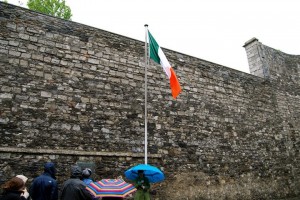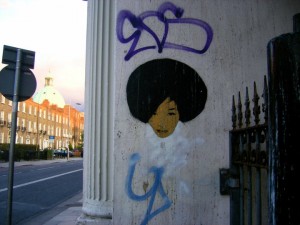By Michaela Dwyer
The night after I arrived in Ireland I went to the Irish Film Institute. Dizzy from jetlag and the surreality of being in a familiar space again after three years, I hardly knew what was “on” at the theaters. I decided to bank on the time my DukeEngage cohort spontaneously watched and enjoyed the Iranian film A Separation, though I think part of my excitement that time came from seeing my Iranian friend excited to connect with the film.
And maybe, subconsciously, I did the same last week when I bought a ticket, ate a rhubarb tart, and sat down alone in a theater full of Irish moviegoers for a very Irish film. Jimmy’s Hall—touted as the last feature by British director Ken Loach—is based on the story of James Gralton, an Irish communist leader who became the first and only “illegal alien” deported from Ireland. Throughout the early 1930s, Gralton helped lead the Revolutionary Workers’ Group in County Leitrim. Despite the inclusion of fiery glances and somewhat vague political intimations, Loach’s film focuses on Gralton’s passionate (co-)direction and defense of a community dance hall in the townland of Effrinagh. The collaboratively run, inclusive venue offered free classes in music, dance, literature, geography, history, and the visual arts, among other subjects. It served as a place for the town to congregate outside the influence of the church, which is portrayed in the film to almost humorous extremity.

“This has to be the fourth time someone has brought up this movie to me this week.” This is Conor, one of the first people I interviewed as I attempt to document the abrupt closure and ensuing limbo of The Exchange, a collaborative arts-centered venue in downtown Dublin. Conor and his friend Philip, another Exchange volunteer, chuckled at the uncanny similarity between film and reality, past and present. Then they shook their heads and sighed, scratched their beards, and looked downward in unison.
Beyond talk of the typical romanticized-from-afar Irish regalia—shamrocks and green pastures, Guinness, et al—are the more complex things we think we know about the—or any—country. The Famine, the Troubles, the decades of emigration, the pervasive stronghold of the Catholic Church. The “800 babies.” (It’s worth mentioning that these issues barely break the surface of newer ones: immigration and multiculturalism, austerity and the banking crisis, Gen-Y ennui and frustration). And then there’s what many people I’ve talked to refer to as “the amnesia.” A collective forgetting—of the country’s history, of the past that continues to repeat itself in the way that forgotten pasts do. I meet another Exchange volunteer on the way to a community radio show on which I’m apparently guest-starring to talk about my research on their venue. He gestures to storefronts we pass and tells me his next project is finding a way to document Dublin’s abandoned buildings—spaces with histories that people seem not to know or care about. Apparently he’s discovered that The Exchange had a predecessor—another collectively run arts space whose façade still stands down by the River Liffey. It’s the amnesia again, he says. The city as palimpsest, Teju Cole says.
Being here this time has started to feel like an odd nesting-doll challenge in which I fold myself smaller and smaller into a network that becomes bigger and more expansive with each encounter, SMS text, radio show appearance. I see a narrative—of this project, of The Exchange or Gralton’s dance hall, of Irish history—ever so slightly taking shape; then it gets fuzzy, and all I see are people who, like me, care deeply about things. I see a buzzing livelihood around a scene that I’m not quite a part of and a history that, despite my heritage, I don’t necessarily share in an immediate sense. But I want to; in the same way I want to be in an Irish cinema seeing an Irish historical drama or in a hotel ballroom in Dublin 8 for the Africa Day Awards, celebrating the African community in Ireland. And in the same way that I keep asking myself why this project interests me so much. Is it because I would’ve sought out The Exchange had I lived here in its heyday? Because my understanding of strong community has always been through education and the arts?
Or is it that I want to work against the ways in which we may too-briskly position ourselves against an ‘other’—whether that be a group of young volunteers, the Dublin City Council, immigrants, emigrants, a country’s history? Because I want to challenge my own interests in the ‘story’ in the first place?
My response: yes, and. My greatest hope with the work I make, whether it be a blog post, an audio documentary, or choreography through a city street, is that I can open both myself and others to multiple ways of being. To claim spaces where we feel comfortable interrogating ourselves, and to see if those spaces connect us in turn. Is it all the Leslie Jamison I’m reading? Yes, and. Is it a challenge to collective amnesia? Yes, and.


